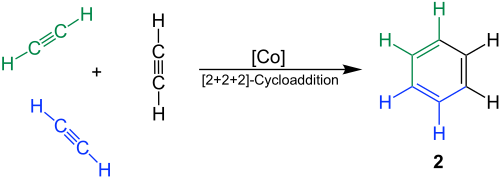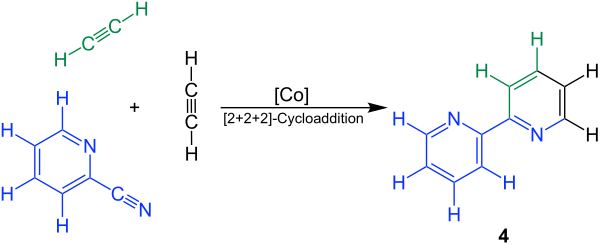Bönnemann synthesis
The Bönnenmann synthesis or Bönnemann cyclization is a process for the preparation of pyridine and pyridine derivatives . This trimerizes a nitrile with two equivalents of an alkyne . Cobalt complexes serve as a catalyst .
The reaction is named after the German chemist Helmut Bönnemann (1939–2017).
Synthesis of pyridine
If a nitrile and two acetylenes are trimerized in the Bönnemann synthesis, pyridine 1 is formed :
The pyridine synthesis is similar to the trimerization of acetylene discovered by Walter Reppe with the formation of benzene 2 :
Synthesis of pyridine derivatives
If substituted alkynes or nitriles are used as starting materials in the Bönnemann synthesis , different pyridine derivatives can be produced. The following two representations show examples for the synthesis of pyridine derivatives:
In this example, a pyridine derivative 3 with ether functions is obtained as the product. 3 played an important role in pharmaceutical synthesis as early as the 1980s.
In a further example, the polynuclear pyridine derivative 2,2'-bipyridine 4 is obtained:
The synthesis of 2,2'-bipyridine was of industrial interest in the 1980s as 4 was needed for large-scale herbicides .
Individual evidence
- ^ A b c d Walter Reppe, Walter Joachim Schweckendiek: Cyclizing Polymerization of Acetylene. III Benzene, Benzene Derivatives and Hydroaromatic Compounds. In: Justus Liebigs Annalen der Chemie , 1948, 560 (1), pp. 104-116, doi: 10.1002 / jlac.19485600104 .
- ↑ Helmut Bönnemann: Cobalt-catalyzed pyridine syntheses from alkynes and nitriles In: Angewandte Chemie 90, 1978, pp. 517-526, doi: 10.1002 / anie.19780900706 .



